While the name “Jinzun” doesn’t immediately evoke images of beckoning swells and swaying palm trees the way that Kuta Beach, Waikiki or the Sunshine Coast does, this sleepy fishing village just off Highway 11 on Taiwan’s southeast coast is attracting more international surfers each year. On Nov. 25, hundreds of surfers — including 60 from overseas — will descend on the black sand beach to compete in the fifth annual Taiwan Open of Surfing.
Such a spectacle would have been unheard of 10 years ago. For decades, Taiwan’s pristine coastline was sealed off for military drills. Even after the lifting of martial law in 1987, few people ventured out to the coast, as they were taught to fear the ocean. Just a few months ago, shop owners responded with astonished stares when I inquired about surfboard rentals in Dulan, a few kilometers south of Jinzun in Taitung County.
“All of this is changing though,” says Kathy Tang (唐詠誼), the event director of the Taiwan Open of Surfing. “I’ll bring my children to the beach and teach them about water safety, even if the lifeguard — if there is a lifeguard — doesn’t know too much about it.”
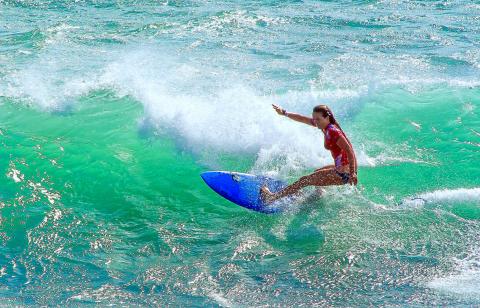
Photo courtesy of Taiwan Open of Surfing
When we meet for coffee near Taipei 101, at first glance, Tang’s super-sleek pantsuit and hassled appearance — her phone is constantly ringing — seems to belie her love for the ocean. Although her tan suggests that she’s a surfer girl at heart.
“When it gets too busy in Taipei, I just take off and head to the Sunshine Coast in Australia,” Tang tells me.
THE TAITUNG EXPERIENCE
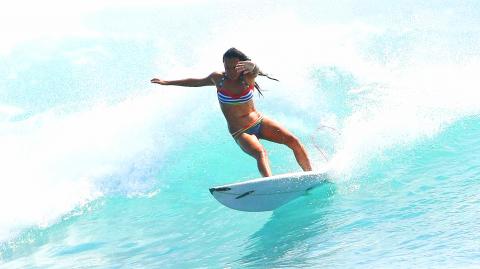
Photo courtesy of Taiwan Open of Surfing
Learning to swim is not compulsory in most local schools across Taiwan, and many lifeguards are still inadequately trained. Tang thinks a system like Australia’s — where lifeguards have to pass a series of rigorous tests and renew their license every year, and having flags on the beach to indicate when it’s safe to swim — would benefit Taiwan’s beach-goers and reduce the number of drownings every year.
But the fact that one of the biggest surf competitions in Asia is taking place in Jinzun next week is already a promising sign. For Tang, though, the dream is simply to see Taitung County become a laidback, family-friendly surf destination in comparison to more hyped-up places like Bali or Phuket.
“We don’t want surfers to just come to Taitung, surf and go home,” Tang says.
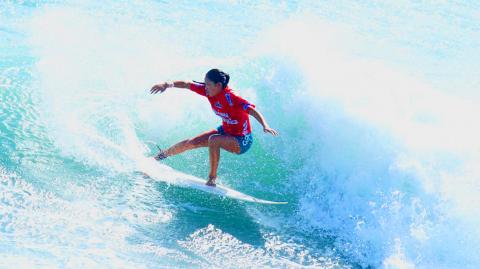
Photo courtesy of Taiwan Open of Surfing
Instead, she believes that it’ll be a more memorable experience for them if they also have a chance to explore Taitung’s parks and mountains with their families and kick it back with a beer on the beach in the evening — just like they would during a vacation.
EMBRACING THE LIFESTYLE
While raising Taiwan’s international reputation as a surf destination is important, so is fostering the local surf culture.
“We need to show [people] that they don’t need to travel all the way to Indonesia or Thailand to go to a beach.”
In fact, from Donghe down to Dulan, Taitung’s beaches offer consistent swells and warm waters all year round.
When I ask Tang about the competition’s male-to-female ratio, she says that only 10 percent of the surfers are female, and out of that, just a handful are Taiwanese. She speculates that it’s because women are still afraid of getting a tan, although an increasing number are also starting to don bikinis and embracing a lifestyle where surfing is seen as healthy and fashionable.
“There are photographers at these competitions, so the element of being seen is motivation enough,” Tang says.
It wasn’t exactly the answer I was hoping for. But it’s a start.
The Taiwan Open of Surfing kicks off on Nov. 25 at Jinzun Harbor and lasts until Nov. 29.
Event notes
What: Taiwan Open of Surfing (台灣國際衝浪公開賽)
When: Nov. 25 to Nov. 29
Where: Jinzun Harbor, Donghe Township, Taitung County (台東縣東河鄉金樽漁港)
Admission: Free
On the net: www.facebook.com/taiwanopenofsurfing
Getting there: Take the express train from Taipei Main Station (台北火車站) to Taitung Station (台東火車站); train ride takes three and a half hours. Take a taxi (NT$800) or bus 8101 (NT$160) from Taitung Station to Jinzun (金樽); ride is approximately one hour.
Accommodation: There are a number of B&Bs and hostels in Donghe and Dulan but it’s best to book early
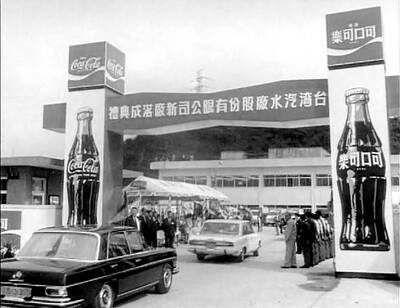
July 28 to Aug. 3 Former president Chiang Kai-shek (蔣介石) reportedly maintained a simple diet and preferred to drink warm water — but one indulgence he enjoyed was a banned drink: Coca-Cola. Although a Coca-Cola plant was built in Taiwan in 1957, It was only allowed to sell to the US military and other American agencies. However, Chiang’s aides recall procuring the soft drink at US military exchange stores, and there’s also records of the Presidential Office ordering in bulk from Hong Kong. By the 1960s, it wasn’t difficult for those with means or connections to obtain Coca-Cola from the

Fifty-five years ago, a .25-caliber Beretta fired in the revolving door of New York’s Plaza Hotel set Taiwan on an unexpected path to democracy. As Chinese military incursions intensify today, a new documentary, When the Spring Rain Falls (春雨424), revisits that 1970 assassination attempt on then-vice premier Chiang Ching-kuo (蔣經國). Director Sylvia Feng (馮賢賢) raises the question Taiwan faces under existential threat: “How do we safeguard our fragile democracy and precious freedom?” ASSASSINATION After its retreat to Taiwan in 1949, the Chinese Nationalist Party (KMT) regime under Chiang Kai-shek (蔣介石) imposed a ruthless military rule, crushing democratic aspirations and kidnapping dissidents from
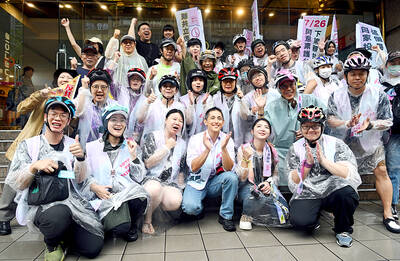
Taiwan is today going to participate in a world-first experiment in democracy. Twenty-four Chinese Nationalist Party (KMT) lawmakers will face a recall vote, with the results determining if they keep their jobs. Some recalls look safe for the incumbents, other lawmakers appear heading for a fall and many could go either way. Predictions on the outcome vary widely, which is unsurprising — this is the first time worldwide a mass recall has ever been attempted at the national level. Even meteorologists are unclear what will happen. As this paper reported, the interactions between tropical storms Francisco and Com-May could lead to
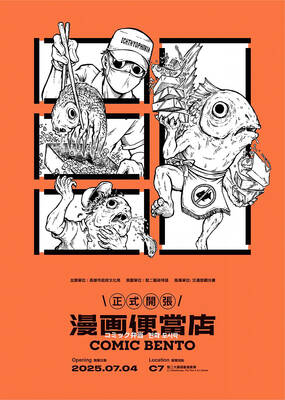
It looks like a restaurant — but it’s food for the mind. Kaohsiung’s Pier-2 Art Center is currently hosting Comic Bento (漫畫便當店), an immersive and quirky exhibition that spotlights Taiwanese comic and animation artists. The entire show is designed like a playful bento shop, where books, plushies and installations are laid out like food offerings — with a much deeper cultural bite. Visitors first enter what looks like a self-service restaurant. Comics, toys and merchandise are displayed buffet-style in trays typically used for lunch servings. Posters on the walls present each comic as a nutritional label for the stories and an ingredient